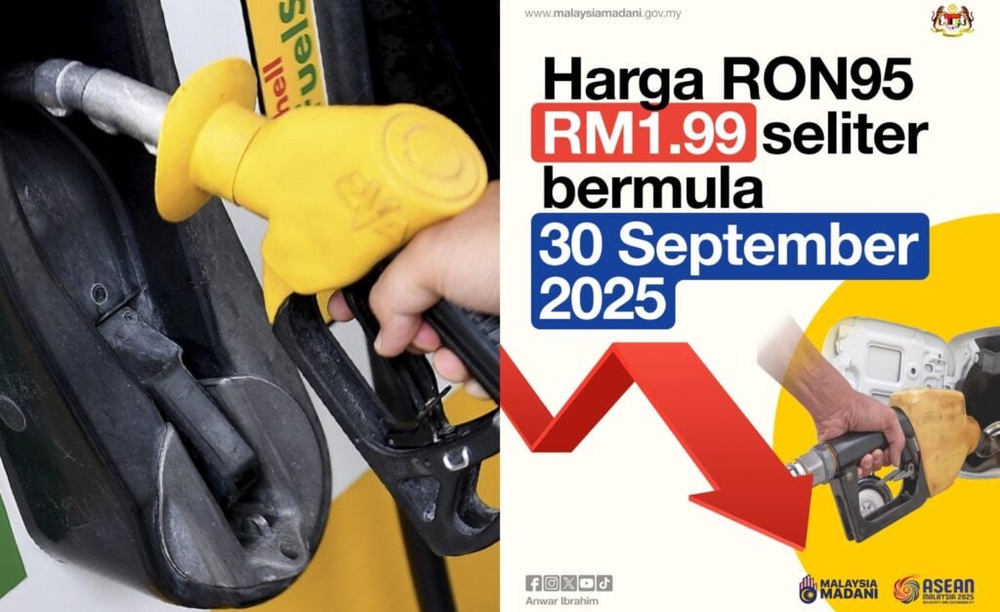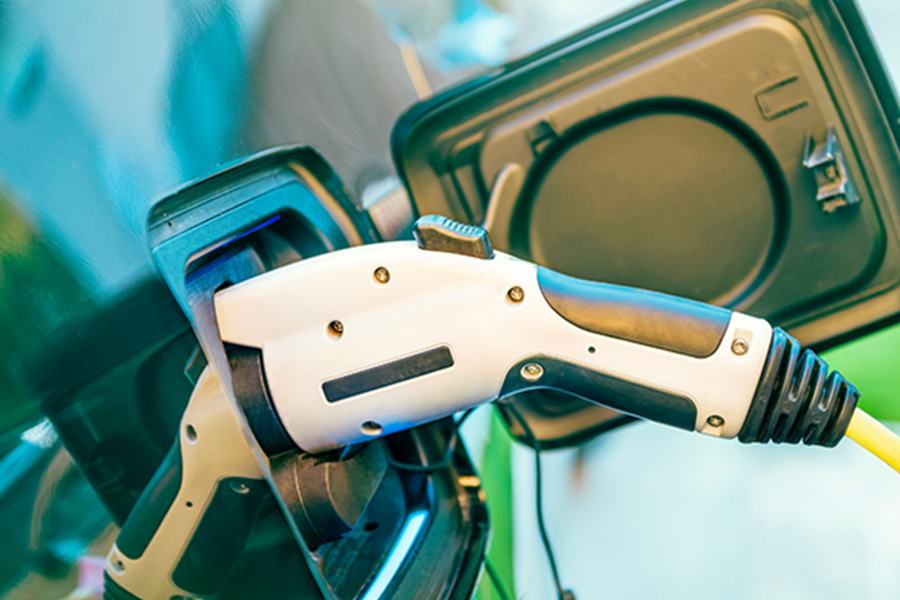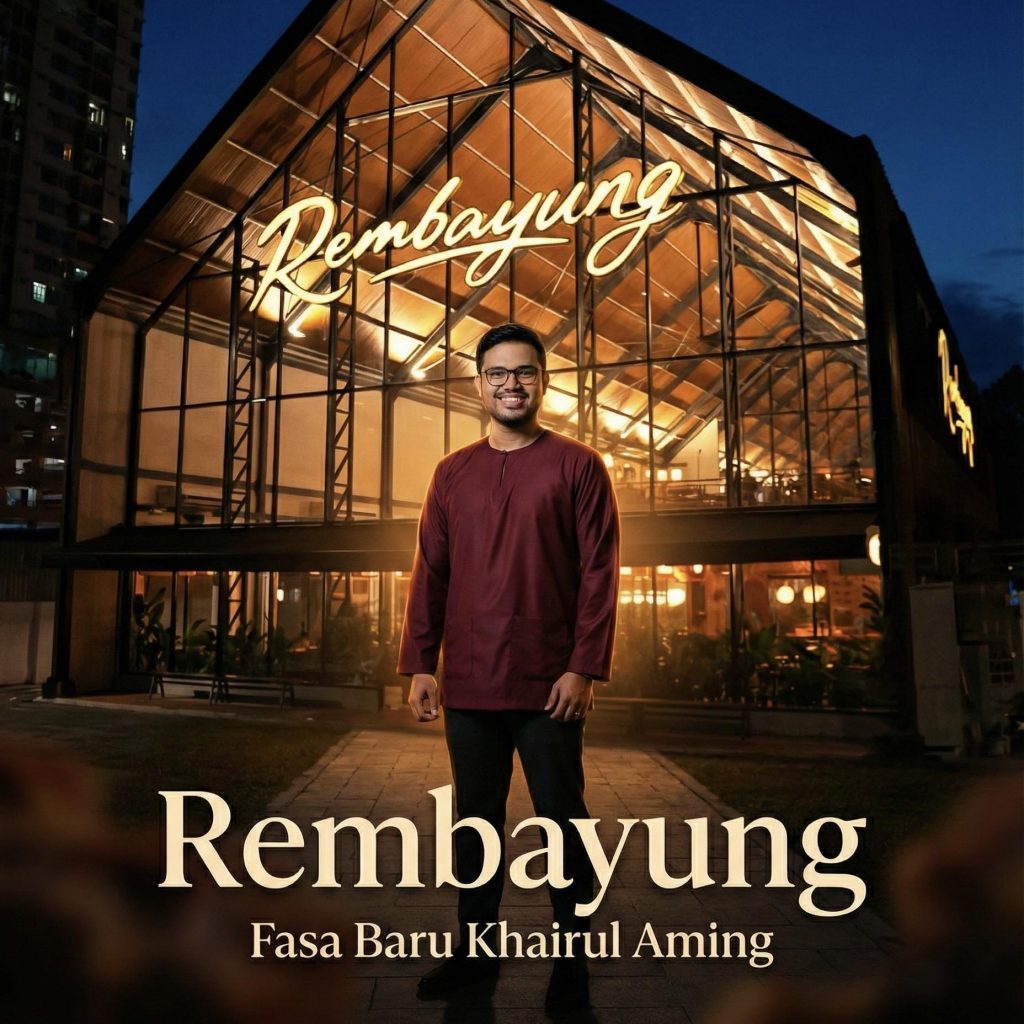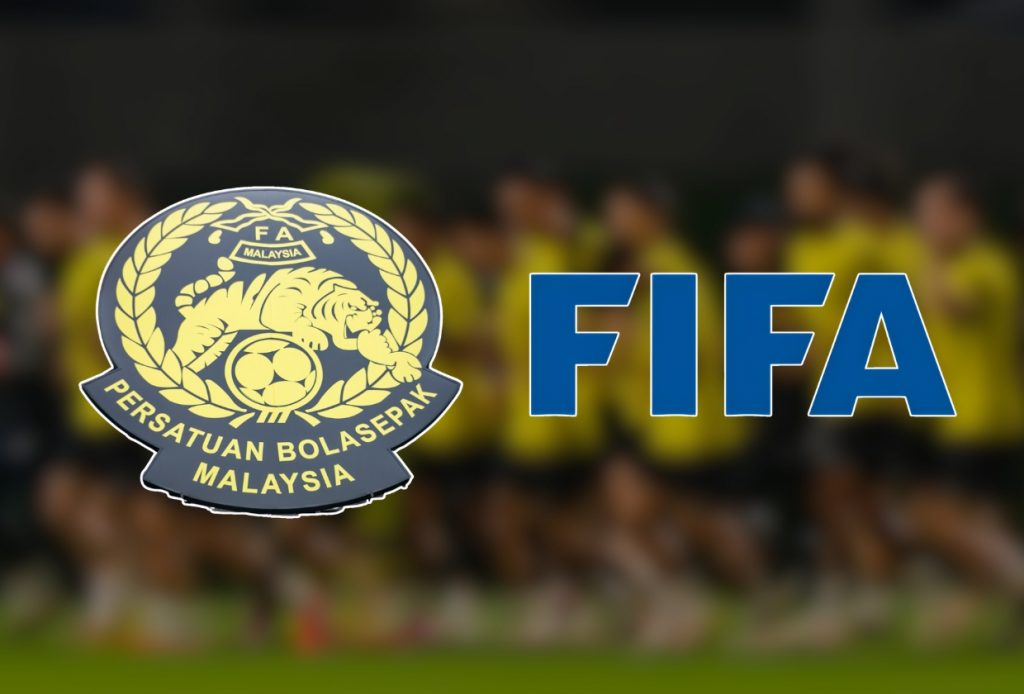Can Malaysia Balance Fuel Equity With Economic Growth?
On 22 September 2025, the Ministry of Finance (MOF), led by Prime Minister Datuk Seri Anwar Ibrahim (PMX), unveiled BUDI95—a targeted RON95 subsidy slashing prices to RM1.99 per litre for Malaysian citizens, effective 30 September 2025. Positioned as a cornerstone of the Madani Economy and 13th Malaysia Plan (RMK13), the bill aims to deliver cost-of-living relief, curb RM2.5 billion to RM4 billion in annual leakages, and promote sustainable fiscal health through equitable redevelopment of fuel subsidies.
However, what started as a step towards rakyat empowerment has turned into a dynamic debate, with netizens scrutinising whether its vision aligns with the realities of accessibility and fairness in Malaysia.
The BUDI95 initiative has generated substantial public interest, with discussions capturing 21,463 mentions and over 1,341,400 engagements across social media platforms since its announcement on 22 September 2025. The program focuses on citizen-only access with mechanisms for verification and quotas, yet it has evolved into a heated conversation, blending optimism about affordability with fears of implementation glitches and exclusion risks.
To benefit from the BUDI95 targeted fuel subsidy, Malaysians must meet specific eligibility requirements set by the Ministry of Finance. The core criteria are straightforward: you must be a Malaysian citizen with a valid driving licence and a MyKad (national identification card). This ensures that the subsidised price of RM1.99 per litre for RON95 petrol is reserved for eligible Malaysians only.
Explore our News Page for more updates and stories shaping Malaysia. Stay informed on key topics like the BUDI95 fuel subsidy and the Malaysia Urban Renewal Bill, both of which have a significant impact on the nation’s future.
 Timeline of Public Reactions
Timeline of Public Reactions
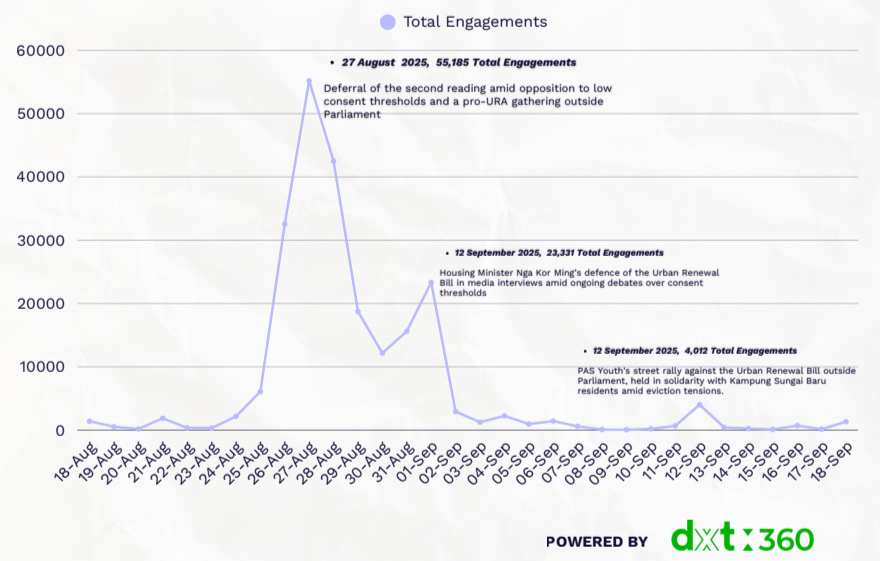
The public’s response to BUDI95 has shifted since its launch, with engagement peaking at critical junctures:
21 September 2025:
Discussions began modestly at 33,061 engagements, as media clarified MyKad prep and early rollout details.
22 September 2025:
Engagement exploded to 920,090, fueled by PMX’s announcement and partner app integrations.
 Where Did the Conversation Happen?
Where Did the Conversation Happen?
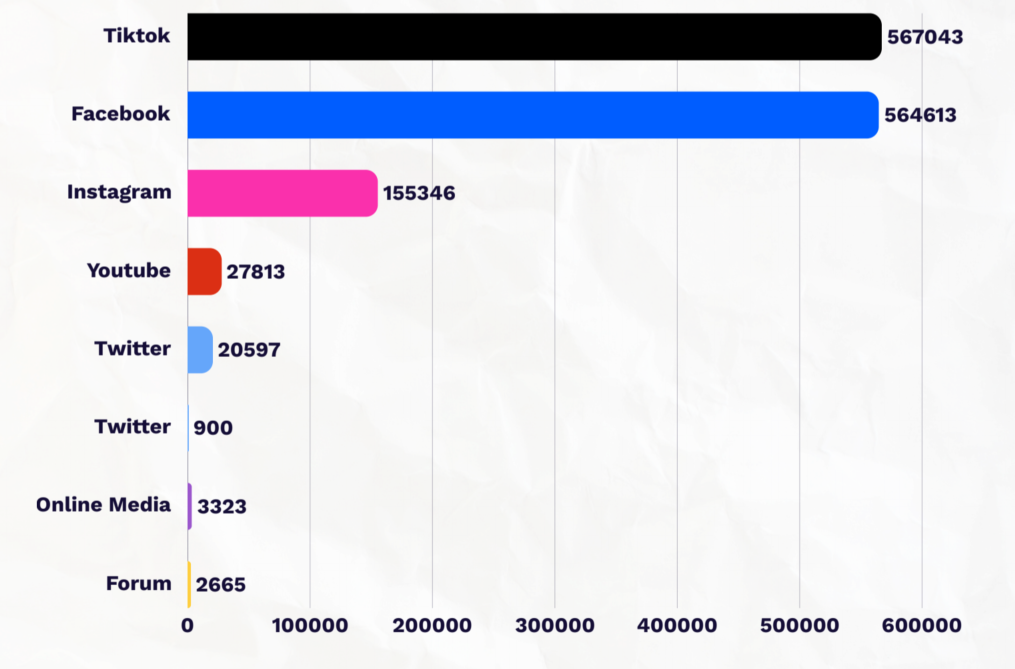
TikTok dominated with viral clips highlighting affordability, Facebook with in-depth community debates, and Twitter with myth-busting threads.
 Key Themes That Drove the Conversation
Key Themes That Drove the Conversation
1. Positive Praise for MADANI and BUDI95 (40%)
The dominant theme was strong support for the BUDI95 initiative and the MADANI government’s leadership. Many praised the reduction of RON95 petrol prices to RM1.99/litre, viewing it as a tangible relief for citizens facing high living costs. The programme was lauded for its equitable subsidy distribution, prioritising Malaysians without income caps, and its role in reducing fiscal leakage while supporting economic stability. The phased rollout for police, military, and STR recipients was seen as a strategic move, earning commendations for its fairness and foresight.
2. Verification Process Concerns (22%)
A significant portion of discussions centred on concerns about the verification process for accessing BUDI95 subsidies. There were worries about the reliance on MyKad and valid driving licences, fearing system downtimes, long queues, or issues with damaged chips. Concerns were raised about potential inconveniences, especially for elderly or rural users, and the risk of being treated as non-citizens if verification fails. There were calls for clearer guidelines and alternative verification methods to ensure accessibility.
3. Quota Limitations (20%)
The 300-litre monthly quota sparked debate, with questions about its adequacy for high-mileage drivers, such as those commuting long distances or visiting family frequently. Concerns were raised about the lack of carry-forward options for unused quotas and the impact on gig workers like e-hailing drivers. While some found the quota sufficient for average use, others urged for flexibility to accommodate diverse needs, reflecting mixed sentiments about the cap’s practicality.
4. Impact on Foreigners (10%)
Discussions focused on the RM2.60/litre price for non-citizens, which some viewed as too lenient compared to past RON97 requirements. Concerns were raised about enforcement, fearing loopholes such as IC borrowing or misuse by non-citizens. While some appreciated the clear distinction between citizen and non-citizen pricing, others worried about cross-border implications, particularly with Singaporean drivers, and the potential for smuggling to persist.
5. Implementation via Apps and Practical Logistics (8%)
Concerns about logistical challenges, particularly the use of apps like Setel and Touch n Go, were evident. Questions arose about the accessibility of app-based verification for less tech-savvy individuals or those in areas with poor connectivity. There were also queries about compatibility with other oil companies’ apps and the reliability of MyKad readers at pumps. Suggestions included offline verification options and broader app integration to ensure smooth implementation.
 Word Cloud Analysis
Word Cloud Analysis
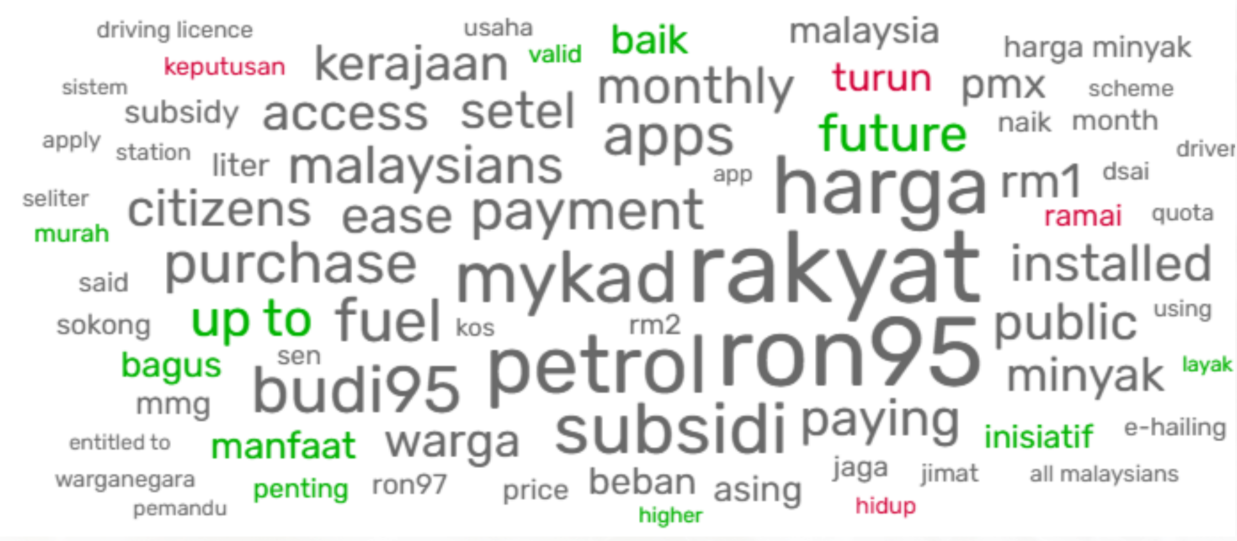
1. “Rakyat” Dominated the Positive Discourse
The word “rakyat” appeared prominently, reflecting that the conversation was firmly centred on the Malaysian public and how the policy affects everyday people. Supporting terms like Malaysians, citizens, and public reinforce the citizen-centric narrative. Positive words like manfaat (benefit), baik (good), and inisiatif (initiative) show that the BUDI95 programme was widely recognised as a well-meaning move to alleviate the beban (burden) of daily hidup (life).
2. MyKad & Driving License Surfaced As The Biggest Friction Points
Concerns over verification and eligibility mechanisms are evident in the presence of mykad and driving licence, which are required for accessing the subsidy. The frequent mentions of access, ease, and apps, particularly Setel, suggest ongoing friction with the digital rollout. While installed and payment imply that many people are trying to comply, the overall discussion points to unease about whether the system will function smoothly and fairly, especially for those who are less tech-savvy.
3. Quota Was Central To Practical Debates
Though 300 litres doesn’t explicitly appear, the structure of the subsidy is evident in keywords like monthly, up to, and purchase, which suggest a volume-based limit. These terms, paired with fuel and ron95, indicate that people are deeply engaged with the practical limits of the policy and how much petrol they can actually buy at the subsidised rate, and how often they need to refill within the scheme parameters.
4. Foreigners Remained A Flashpoint
The words warga and asing (foreigners), frequently paired as warga asing, revealed deep anxieties about non-citizens benefiting from subsidies meant for Malaysians. Keywords such as entitled, paying, and ron97 reflect ongoing debates around price segregation, where citizens are allocated RON95 at RM1.99, while foreigners are expected to pay RM2.60 or use RON97. Many comments went further, raising specific fears that Singaporeans may continue to abuse RON95 access, either through IC borrowing, use of Malaysian driving licences, or lax enforcement at petrol stations, ultimately depleting the national fund meant for Malaysians.
 Social Sentiment Breakdown
Social Sentiment Breakdown
Positive (55%): Optimism over affordability and equitable relief.
Neutral (35%): Informational posts, claim guides, and updates.
Negative (10%): Frustration with quotas and MyKad hurdles.
 What Netizens Were Saying
What Netizens Were Saying
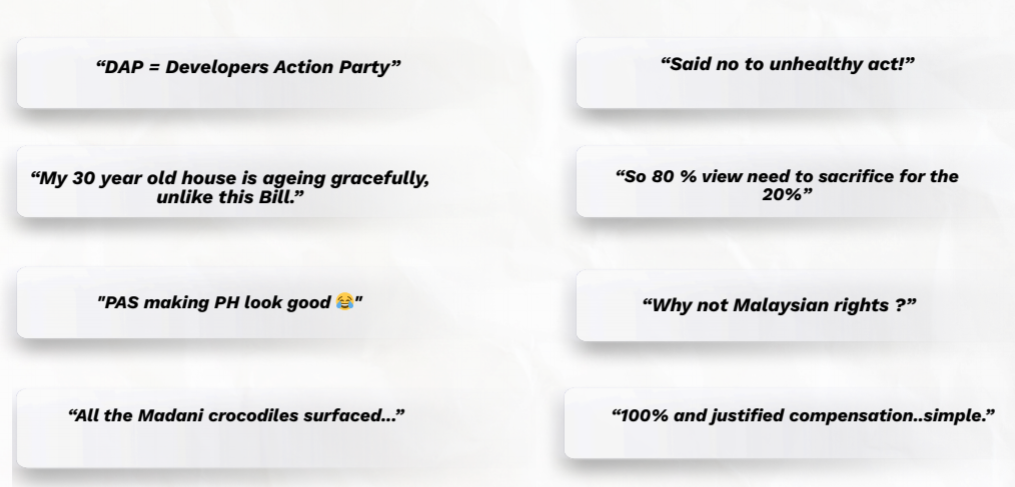
 Final Takeaways
Final Takeaways
 Clarity builds trust:
Clarity builds trust:
Rakyat want seamless access. BUDI95 policy should empower, not exclude.
 Equity isn’t one-size-fits-all:
Equity isn’t one-size-fits-all:
From B40 to vendors, flexibility in quotas and verification is essential, not optional.
 Transparency is key:
Transparency is key:
In the digital age, policy must be clearly communicated and open to dialogue.





